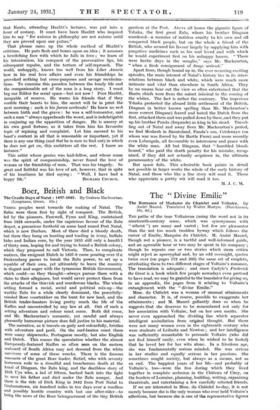Boer, British and Black
The Cradle Days of Natal : 1497-1845. By Graham Mackeurtan. (Longman, Green. 15s.)
THREE peoples went towards the making of Natal. The Zulus were there first by right of conquest. The British, led by the pioneers, Farewell, Fynn and King, maintained from 1824 onwards, under the capricious favour of the Zulu despot, a precarious foothold on some land round Port Natal, which is now Durban. Most of these died a bloody death, but there they hung on hunting and trading in ivory, buffalo hides and Indian corn, by the year 1835 still only a handful of thirty men, hoping for and trying to found a British colony, which they proposed to call Victoria. Then, to complicate matters, the emigrant Dutch in 1837-8 came pouring over tie Drakensberg passes to break the Zulu power, to set up a republic of their own, yet ultimately to leave the country in disgust and anger with the tyrannous British Government, which could—so they thought—always pursue them with a claim to their allegiance, but would never protect them from the attacks of the thievish and murderous blacks. The whole setting formed a racial, social and political mix-up—the warlike Zulu for a while clearly dominant, the peacefully- minded Boer voortrekker on the hunt for new land, and the British trader-hunters living pretty much the life of the Kaffirs and uncontrolled by any law at all. Out of such a setting adventure and colour must come. Both did come, and Mr. Mackeurtan's romantic, yet careful and always pleasantly humorous picture does full justice to his material.
The narrative, as it travels on gaily and colourfully, bristles with adventure and peril. On the surf-beaten coast there were many shipwrecks, Portuguese mostly, but also English and Dutch. This rouses the speculation whether the almost Europeanly-featured Kaffirs so often seen on the eastern seaboard of South Africa may not descend from the white survivors of some of these wrecks. There is the famous massacre of the great Boer leader, Retief, who with seventy horsemen rode to a dreadful and treacherous death at the kraal of Dingaan, the Zulu king, and the deathless story of Dirk Uys who, a lad of fifteen, harked back into the fight to save his father and died under the Zulu assegai. And there is the ride of Dick King in 1842 from Port Natal to Grahamstown, six hundred miles in ten days over a roadless and possibly hostile country with but one after-rider—to bring the news of the Boer beleaguerment of the tiny British garrison at the Port. Above all looms the gigantic figure of Tshaka, the first great Zulu, whom his brother Dingaan murdered—a monster of ruthless cruelty to his own and all conquered black people, but on the whole a friend of the British, who secured his favour largely by supplying him with purgative medicines such as his soul loved and with which he would experiment first on his unhappy harem. " There were hectic days in the seraglio," says Mr. Mackeurtan, " when a fresh consignment of drugs arrived."
Apart from, though bound up in, the ever recurring exciting episodes, the main interest of Natal's history lies in its inter- relations between black and white, which were much more intimate and vital than elsewhere in South Africa. They by no means bear out the view so often entertained that the Bantu chiefs were from the outset inimical to the coming of the whites. The fact is rather the contrary. The imperious Tshaka protected the absurd little settlement of the British. Dingaan (a better known spelling than Mr. Mackeurtan's more correct Dingane) feared and hated the Dutch from the first, attacked them and was pulled down by then:, and they put up his brother Panda (Impande) as king in his stead. Travel- ling out of Natal and away from Mr. Mackeurtan's period, we find Moshesh in Basutoland, Panda's son, Cetshwayo (on whom war was forced by Sir Bartle Frere) and more recently even Lobengula, all favourable to intercourse and peace with the white man. All but Dingaan, that " humbled blood- hound," who paid the death penalty for his mistake, recog- nized, if they did not actually acquiesce in, the ultimate paramountcy of the white.
But space fails. This admirable book paints in detail not possible in larger works the whole of the early history of Natal, and those who like a fine story will read it. Those who appreciate a pretty wit will read it too.
M. J. C. M.






































 Previous page
Previous page